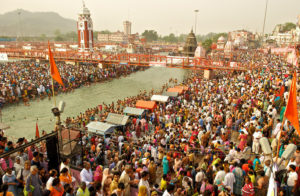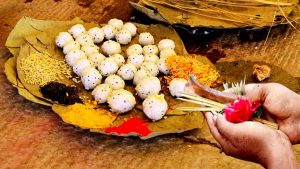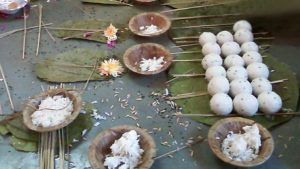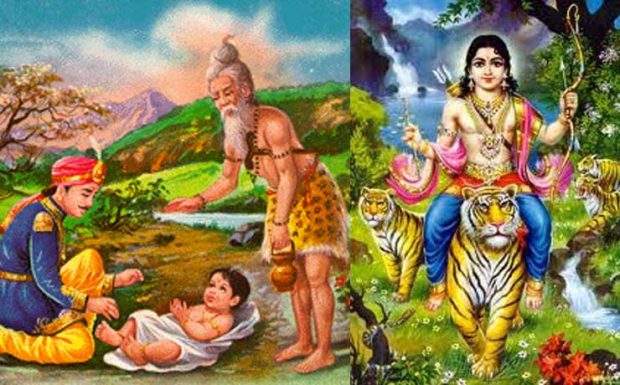Stories of Lord Ayyappa – Part II
The asura princess Mahishi was in anger as Goddess killed her brother, the asura king Mahishasura. Mahishasura was blessed with invulnerability to all men, and so Durga was sent to fight and kill him. Thus, Mahishi began performing Tapasya and pleased Brahma. He granted her the boon of ruling the universe and being invulnerable except to a being that had not been born from a woman’s womb. Since such a person did not exist, she thought she was safe and began conquering and plundering the world. Meanwhile, Basmasura had so pleased lord Shiva with his austerities that Shiva gave him a boon of anything he wished. So Basmasura asked for the ability to burn to ashes anything which he placed his hand over. After being blessed with the boon, Basmasura wanted to test his boon and ran after the Shiva threatening to turn him to ashes. Shiva called to lord Vishnu for help. He hid in a peepal tree as Basmasura ran here and there searching for him. Vishnu became aware of the events and decided that he would take the female form Mohini, the enchanting woman, and try to trump the asura’s powers. When Basmasura saw Vishnu in this form, he fell in love. He earnestly tried to court her. So Vishnu instructed Basmasura to hold his hand over his head and vow fidelity. With this act, Basmasura was reduced to ashes. Vishnu found Shiva and explained the whole affair to him. Shiva asked if he too could see Vishnu in this female form. When Vishnu appeared thus, Shiva was overcome with passion and united with “her”. The two gods thus became “Harihara” that is a composite form of Shiva and Vishnu as one God. From this union lord Ayyappa was born. He combines in himself the powers of Vishnu and Shiva and is a visible embodiment of their essential identity. They left the boy in the forest near River Pampa. The Pandalam king, Rajasekara, went for hunting in the forest adjoining the banks of River Pampa, along with his men. He started hunting courageously in the dense forest which was a sanctuary for many wild animals. After that hunting was over, Rajasekara advised his men to take rest and sat there entertaining himself with the sight of the natural greenish beauty and the waterfalls, of the forest. At that time, he heard a child crying from somewhere in the forest. Surprised, he went round and reached the banks of River Pampa. There he saw a beautiful and divine child, Ayyappa, kicking his legs and crying out, and was in a dilemma whether to take the child to the Palace or leave it there itself. While the King was engrossed in his thoughts, a saint appeared before him and told the King that he need not be afraid of the child and take him to the Palace. The saint further stated that when the child completes twelve years, the King would know his divine history. After uttering these words, the saint disappeared.
Rajasekara was very joyous and he took the child to his Palace and briefed the Queen about the incident. The King and the Queen, having prayed to Lord Shiva for a child, were very happy that they had been blessed with a child. The people also felt happy that an heir to inherit the Kingdom after the King has been found. When the Ayyappa, named Manikanta, began to grow in the Palace, everything began to prosper in kingdom. He was taught all martial arts and vedas and the Guru was surprised at his brilliance and agility and the extraordinary talents. The Guru came to the conclusion that he was not an ordinary child, but a divine power. After completing his education under the Guru, Manikanta approached the Guru to offer his Guru Dakshina. When Manikanta went to his Guru for his blessings, the Guru told him that he already knew that he was a divine power and he was blessed for having been given an opportunity to have Manikandan as a student. The Guru further told Manikandan that he had one request to make that his only son who was dumb should be given speech. Manikanta called the Guru’s son and put his hands on his head and immediately Guru’s son had his speech. Manikana requested the Guru not to reveal this to anyone and went to the Palace.
Meanwhile, the Queen gave birth to a male child and the child was named RajaRajan. King Rajasekara, impressed with the talents of Manikanta, decided to crown him, treating him as his eldest son. He ordered the minister to make arrangements for the same. However, the minister who was thinking that he would be the next crown after Rajasekara was worried and started devising plans to prevent Manikanta from being crowned. Having failed in all his attempts to kill Manikana, the minister approached the Queen and told her that she had her own son, it was not correct to crown a person who came from the forest. He suggested that the Queen should pretend as if suffering from a severe headache and he would make the physician tell that only a tigress’ milk should be brought to cure the Queen and since Manikanta would only go to the forest to bring the milk, he would be in danger from the wild animals. The Queen agreed to do what he told so that her son could succeed the King to the throne. The Queen, as told by the minister, cried out loudly that she was suffering from a severe headache and stomach pain and the King, believing this, called the minister to bring in the best physicians to treat her. The Physician, brought by the minister examined the Queen and told the King that it could be cured only by applying Tigress’ milk.
Manikanta, realising that the time has arrived, asked the king to let him go to the forest promising to bring the milk. However, the King refused to let him go. Manikanta pursued the King and finally permitted Manikanta to go to the forest. King Rajasekara made arrangements to send a group of his loyal men along with him, but Manikanta refused. Rajasekara sent along with Manikanta the necessary foodstuffs and coconuts with three eyes, in remembrance of Lord Shiva. The Panchabuthas, sent by Lord Shiva, accompanied Manikanta to the forest. Mantikanta entered the forest to fulfil his divine duty, to rid the world of Mahishi. Manikanta went to Mahishi and fought a battle. During the conflict, Manikanta threw Mahishi down to earth from devaloka and she fell on the banks of Azhutha River. Manikanta clashed with her at Azhutha river again. At the end of the battle, Manikanta climbed up on her chest and danced violently. Mahishi knowing that the divine power dancing on her body was none other than the son of Hari and Hara, prostrated before Manikanta and died. This dance was witnessed by Lord Shiva and Mahavishnu from a place called Kalakatti. (It is said that Leela, daughter of Kavalan, a Maharishi, due to her husband’s curse, was born as daughter of Karamban, with a face of Mahishi and freed herself from the curse and obtained Moksha by the grace of Shri Dharma Sastha, which is described in Sabarimala Temple as Malikaipurothama, by which name she has a temple there). After killing Mahishi, Manikanta went to the forest for the tigress milk, when Lord Shiva appeared before him and told him that though he had done good for the Devas, still there was one main task and that was to give comfort to the King Rajasekara who was very concerned about him. Lord Shiva further told him that he could go to the Palace with Lord Indra in the form of a tiger. With Manikanta on the tiger, all female devatas in the disguise of a tigress started their journey to the Palace. After seeing this, the schemers were frightened into confessing their plot. They were convinced of his divine origins and prayed to him to be with them for their own salvation and for the safety of the kingdom. Immediately Manikanta disappeared. The king would not eat anything if Manikanta did not come back. Then Manikanta gave a vision (Darshan) to the king. Filled with emotions of happiness, grief, fear, wonder and ‘Bhakti’ (devotion to God) and self-surrender, the king stood praying for the mercy and blessings of Manikanta. He repented he could not fully visualise the truth of the divine powers of the Lord and repeatedly requested Him to forgive him for behaving as if He were his son only. The Lord lovingly embraced the King who prayed to bless him by freeing from ego and the worldly life of birth and rebirth and grant Moksha (salvation). He told the King that he was destined to return. The king implored Lord Manikanta to allow him to build a temple and dedicate it to him and the Lord assented.
Manikanta then enlightened the King on the path of attainment of Moksha. The Lord shot an arrow that fell at the top of Sabrimala and told the King that he could construct a temple at Sabarimala, north of the holy river Pampa and install His deity there. Ayyappa also explained how the Sabarimala pilgrimage shall be undertaken, emphasising the importance of Penance vratham and what the devotees can attain by His ‘darshan’. But before the departure of the Lord, the King secured a promise from the Lord that on Thai Pongal on January 14, every year, (celebrated as “Makara Jyothi” all his personal jewellery (usually kept at the Palace) will be adorned on Lord Ayyappa’s statue at Sabarimala.
To read the other stories click here
Reach us to be a part of our whatsapp spiritual reminder group








